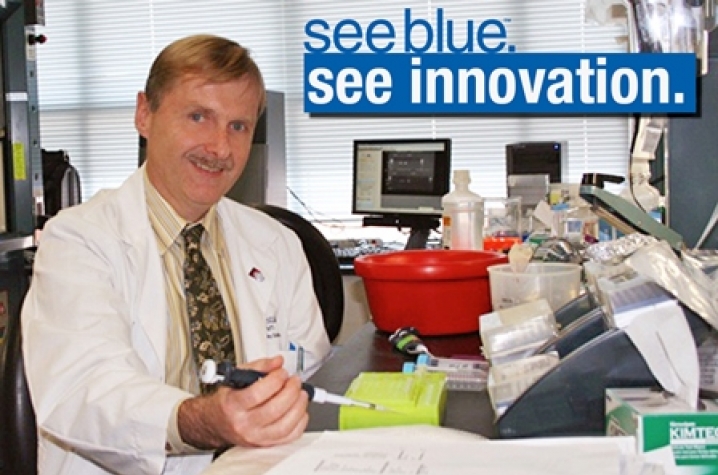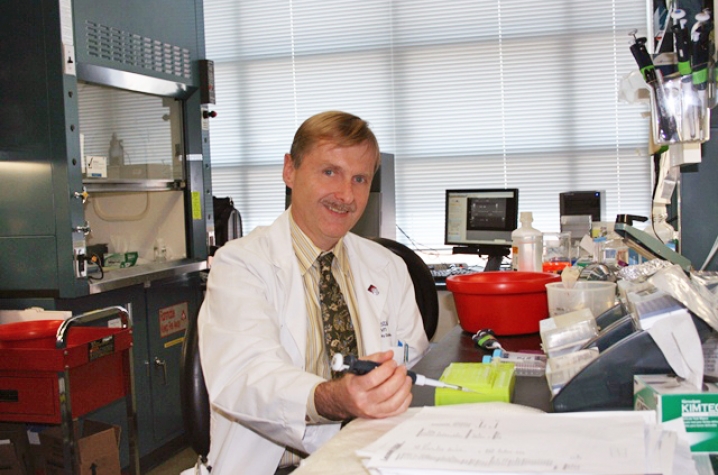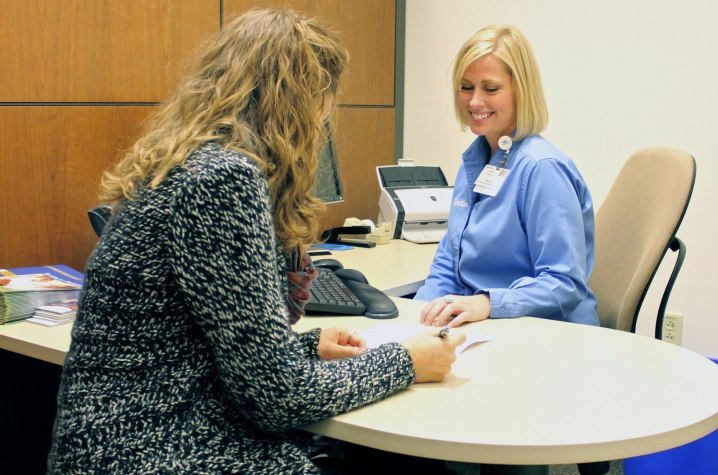Innovative Biobank Will Enhance Research Capacity for Biomedical Investigators
LEXINGTON, Ky. (Nov. 8, 2013) – In biomedical research, access to human tissues is critical in studying a disease or condition, and ultimately in developing drugs and looking for cures. For this reason, the University of Kentucky Center for Clinical and Translational Science (CCTS) is rolling out an innovative project to develop an extensive Research Registry and Specimen Bank, called a biobank, for UK researchers.
The biobank will utilize leftover blood and tissue from normal medical procedures. For example, when a patient undergoes a blood draw or tissue biopsy, the blood or tissue that isn’t used for testing is normally thrown away. In the new biobank project, however, patients will be given a consent form to allow any “leftover” blood or tissue from their regular medical procedures to be stored in the biobank for research purposes.
Participation is voluntary, and no additional procedures will be performed or extra blood or tissues collected. To protect patient privacy, all identifying information (such as name, address and social security numbers) will be removed from the samples and corresponding medical records. Researchers who use the biobank will sign confidentiality agreements, and all biospecimen information will be stored in a secure database.
As a large, research-oriented academic medical center, UK is in a distinctive position to develop and leverage this biobank, which will be unique in several ways. Many academic medical centers maintain smaller biobanks for DNA or particular diseases, and these biobanks are often proprietary to a specific research center and collect tissue only retroactively. For example, a biobank housed in a cancer research center will only collect cancer tissue, and that tissue sample will only be available to cancer researchers. Alternatively, UK’s biobank will be extensive, global, and prospective in nature.
“This is a unique biobank,” said Dr. Philip A. Kern, director of CCTS. “Other universities have freezers full of tissues, but we’re doing this in a more global fashion, upfront at registration, rather than in a retroactive, disease-specific fashion. This gives us more flexibility to get larger numbers of samples and get samples that we might not have thought about.”
Because of the large and diverse patient population at UK, the potential size and scope of the biobank is huge. In the initial phase of the roll out, which began on Nov. 4, only elective surgical patients are receiving biobank consent forms. All UK patients, both inpatient and outpatient, will begin receiving biobank consent forms by January 2014. UK HealthCare sees about 35,000 patient discharges annually, which could translate into a robust biobank of both healthy and non-healthy biospecimens of all varieties.
“We hope that most patients will agree to participate,” said Kern. “It’s an opportunity for people to give back and be a part of research in a way that doesn’t cost them anything, by donating tissue that would otherwise be thrown away.”
The global nature of the biobank applies not only to inclusion of the general patient population, but also to researcher access. Whereas other biobanks are often proprietary and only available to researchers within a specific research center, the UK biobank will be available to all UK researchers.
However, the Markey Cancer Center will be a primary beneficiary of the biobank because it will greatly increase the capacity of its existing cancer tissue bank. The next phases of the roll-out process for the biobank will be in the Markey outpatient clinic.
"As an National Cancer Institute-designated cancer center, groundbreaking cancer research is a top priority for Markey, and the biobank will be a tremendous resource for our researchers to further develop and test their work," said Dr. Mark Evers, director of the UK Markey Cancer Center. "By allowing us to keep blood and tissue samples that would have otherwise been discarded, our patients are providing a way to improve cancer care for many of our patients in the future."
The sheer size of the biobank will allow an unprecedented degree of flexibility in biobanking. Since it will be impossible and unnecessary to keep and store all collected tissue, the biobank will respond to specific research goals and investigators’ needs. For example, if a researcher needs spinal fluid specimens for her study, the director of the biobank will be able to increase storage capacity for spinal fluid, along with targeted consenting of patients undergoing a spinal tap procedure in the course of their medical care.
CCTS spearheaded this project as part of its role to enhance the biomedical research capacity across the UK community. “It was logical for CCTS to do this because it enhances the university’s general research infrastructure,” said Kern. The development of such a large and responsive biobank will be an asset and catalyst to all biomedical research at UK, which could lead to improvements in care well beyond the UK patient population.
Ultimately, the biobank will facilitate better and more robust research to improve healthcare, not just in the field of cancer. “We have a lot of basic scientists doing work in animals and they need to figure out if the work has applicability to humans,” said Kern. “They need to be able to find tissues in order to answer that question.”
MEDIA CONTACT: Mallory Powell, mallory.powell@uky.edu







